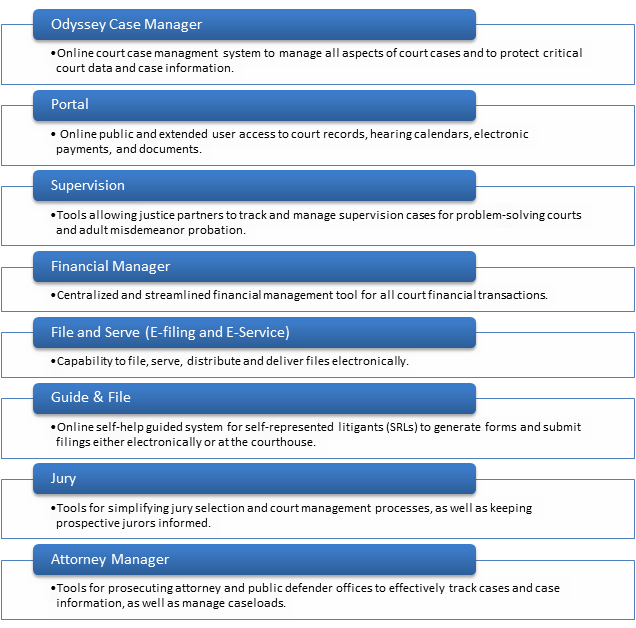iCourt Project Overview & FAQs
Click here to learn more.
The Idaho iCourt project is changing the way our Courts do business and serve the public. We are shifting from a legacy paper-based system to a modern electronic online judicial system by implementing integrated court management solutions and access tools. This project is in partnership with Tyler Technologies Inc., using the Odyssey software suite Tyler is a proven software company with 10 statewide court implementations and over 500 county court implementations across the country.
The project is expected to take 3 years to realize statewide benefits. Once the complete system has been deployed to all counties, it will provide improved access to electronic court records, hearing schedules, court documents, e-filing and more. This new system will also provide tools to improve business practices amongst justice partners by providing around-the-clock access to court information, reduce costs from handling and storing paper files, streamline court processes, and deliver better information for judicial decision-making.
Below you will find more information about each component of the complete iCourt solution. These capabilities will be available once the statewide implementation is complete.

The replacement of the Court’s existing computer system requires a methodical and deliberate plan to transition over time, but we also recognize the Courts must remain open and functional during this transition between the old system and the new. With this in mind, the Court’s Technology Committee has worked diligently to develop a deployment or “go live” schedule, starting first with a pilot county (Twin Falls), then an early adopter county (Ada), followed by three regional deployments covering the remaining counties of the state. The entire “go live” deployment is projected to take several years. Below is a schedule of the statewide deployment:
1. Twin Falls County - June 22, 2015 LIVE!
2. Ada County - August 8, 2016 LIVE!
3. Wave 1 - October 10, 2017 LIVE!
- Blaine
- Boise
- Camas
- Canyon
- Cassia
- Elmore
- Gooding
- Jerome
- Lincoln
- Minidoka
- Owyhee
- Valley
4. Wave 2 - April 9, 2018 LIVE!
- Adams
- Benewah
- Bonner
- Boundary
- Clearwater
- Gem
- Idaho
- Kootenai
- Latah
- Lewis
- Nez Perce
- Payette
- Shoshone
- Washington
5. Wave 3 - October 9, 2018
- Bannock
- Bear Lake
- Bingham
- Bonneville
- Butte
- Caribou
- Clark
- Custer
- Franklin
- Fremont
- Jefferson
- Lemhi
- Madison
- Oneida
- Power
- Teton
- Transition to an electronic court record
- Optimize the time and use of existing court personnel
- Maximize efficiencies of court processes by leveraging automation as much as feasible
- Provide capability for court staff to fully transition, consume and manage electronic court documents
- Reduce the need for physical storage space of court case files
- Transition existing staff from manual tasks, such as physically pulling files and tracking paper records across the court, and shift to providing enhanced services to the public
- Enable counties to avoid the need to hire more staff as court caseloads increase
- Enable shared statewide data via a unified, statewide case management system
- Transition to a fully consolidated statewide judicial system versus managing court data in 44 independent, siloed systems
- Provide the ability to share and manage court and judge calendars within or across districts
- Enable access to shared party information across the state
- Enable traveling judges to have increased access to court records from other counties
- Allow multiple persons to access and work on the same court record at the same time from different locations
- Provide electronic filing and service
- Enable parties to submit electronic documents to Idaho’s Courts, 24/7/365 from anywhere
- Automatically file documents into the electronic court case record, improving overall efficiency and timeliness
- Enable self-represented litigants the ability to easily file court documents for the most needed court cases
- Allow filing parties to digitally serve others and eliminate paper service costs, including time and mailing costs
- Enhance access to court documents
- Provide 24/7 access to Court records for the public, attorneys, commercial entities and judicial partners
- Leverage document access and document purchase as a potential revenue source for the Idaho Judicial Branch to sustain the Court’s technology assets
- Provide a capability for attorneys to have access to online documents similar to the Federal System (PACER)
- Enhance statewide, district and local court data reporting capabilities
- Support consistent, unified case flow management across all of Idaho’s courts
- Provide the ability to perform data analytics, case metrics, and statistical reporting on a statewide, district and county level
- Enable working from remote locations
- Provide greater flexibility for judges, clerks and others to work from remote locations
- Facilitate standardized supervision and problem-solving practices
- Standardize reporting practices and data gathering to provide better access to for problem solving courts
- Provide a statewide supervision application to manage adult misdemeanor probation
- Deliver a consistent application for the management of pre-trial services
- Enable better evaluation of supervision programs and problem-solving courts
- Empower users to make better recommendations about people being supervised
- Transition the Idaho Judiciary Branch’s existing appellate case management system, used for the Court of Appeals and the Idaho Supreme Court, to the statewide case management system
- Provide core case management features such as calendaring, time standards, workflow and document/content management
- Track appellate cases and support unique appellate case management functionality, namely panel and opinion management
- Improve data exchange with the Idaho Judicial Branch’s justice partners
- Maintain existing data exchanges to other ancillary systems using a similar exchange method or implement a direct integration/interface with the judicial partner’s system
- Provide the technical foundation to create or extend data interfaces from the new case management solution with other ancillary systems for specific functionality in order to attain operational efficiencies
- Deliver a statewide jury management system
- Transition Idaho to a statewide jury management application management to assist with jury selection and management processes to include a public interface option
- Preserve Idaho’s existing case data and convert to the new case management system
- Convert and integrate all existing legacy court case data into the new, statewide case management environment
Click here to learn more.
There are two main reasons the Idaho Courts must replace its computerized case management system. The first is the Court’s aging statewide computerized case management system, Idaho Statewide Trial Court Automated System (ISTARS), has been declared by its vendor to be at “end of life.” The second reason is to meet the Court’s Constitutional mandate to “resolve court cases without delay,” a modern computer system to meet today’s business environment is a must. There have been significant advances in technology which provide tremendous efficiencies the current system cannot deliver.
Recognizing the inevitable end of the existing system, and the need for significant “due diligence” relating to an effort of this magnitude, the Supreme Court established a Court Technology Committee, which is chaired by the Chief Justice and includes judges, clerks, attorneys, and administrators. With the assistance of three nationally recognized court technology experts and a Design and Implementation Committee, the Court undertook a careful analysis of the available options and concluded that a move to a modern, web-based case management system would best serve Idahoans for the next generation. Through an extensive RFP process, the proven case management software known as Odyssey by Tyler Technologies was selected as the most capable and cost effective system.


